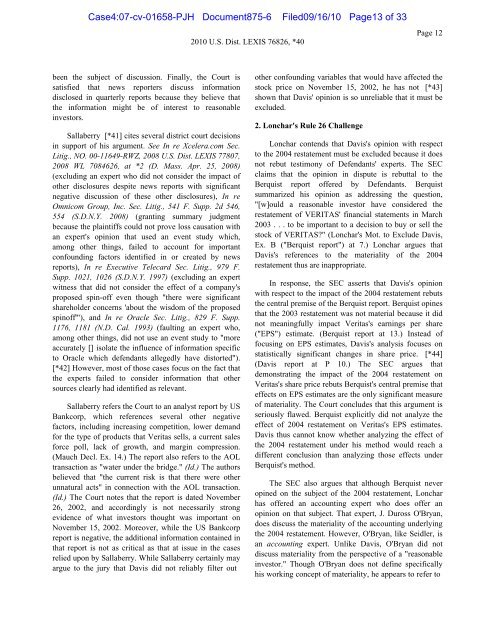exhibit 2 - SAP Lawsuit Portal
exhibit 2 - SAP Lawsuit Portal
exhibit 2 - SAP Lawsuit Portal
You also want an ePaper? Increase the reach of your titles
YUMPU automatically turns print PDFs into web optimized ePapers that Google loves.
Case4:07-cv-01658-PJH Document875-6 Filed09/16/10 Page13 of 33<br />
been the subject of discussion. Finally, the Court is<br />
satisfied that news reporters discuss information<br />
disclosed in quarterly reports because they believe that<br />
the information might be of interest to reasonable<br />
investors.<br />
Sallaberry [*41] cites several district court decisions<br />
in support of his argument. See In re Xcelera.com Sec.<br />
Litig., NO. 00-11649-RWZ, 2008 U.S. Dist. LEXIS 77807,<br />
2008 WL 7084626, at *2 (D. Mass. Apr. 25, 2008)<br />
(excluding an expert who did not consider the impact of<br />
other disclosures despite news reports with significant<br />
negative discussion of these other disclosures), In re<br />
Omnicom Group, Inc. Sec. Litig., 541 F. Supp. 2d 546,<br />
554 (S.D.N.Y. 2008) (granting summary judgment<br />
because the plaintiffs could not prove loss causation with<br />
an expert's opinion that used an event study which,<br />
among other things, failed to account for important<br />
confounding factors identified in or created by news<br />
reports), In re Executive Telecard Sec. Litig., 979 F.<br />
Supp. 1021, 1026 (S.D.N.Y. 1997) (excluding an expert<br />
witness that did not consider the effect of a company's<br />
proposed spin-off even though "there were significant<br />
shareholder concerns 'about the wisdom of the proposed<br />
spinoff'"), and In re Oracle Sec. Litig., 829 F. Supp.<br />
1176, 1181 (N.D. Cal. 1993) (faulting an expert who,<br />
among other things, did not use an event study to "more<br />
accurately [] isolate the influence of information specific<br />
to Oracle which defendants allegedly have distorted").<br />
[*42] However, most of those cases focus on the fact that<br />
the experts failed to consider information that other<br />
sources clearly had identified as relevant.<br />
Sallaberry refers the Court to an analyst report by US<br />
Bankcorp, which references several other negative<br />
factors, including increasing competition, lower demand<br />
for the type of products that Veritas sells, a current sales<br />
force poll, lack of growth, and margin compression.<br />
(Mauch Decl. Ex. 14.) The report also refers to the AOL<br />
transaction as "water under the bridge." (Id.) The authors<br />
believed that "the current risk is that there were other<br />
unnatural acts" in connection with the AOL transaction.<br />
(Id.) The Court notes that the report is dated November<br />
26, 2002, and accordingly is not necessarily strong<br />
evidence of what investors thought was important on<br />
November 15, 2002. Moreover, while the US Bankcorp<br />
report is negative, the additional information contained in<br />
that report is not as critical as that at issue in the cases<br />
relied upon by Sallaberry. While Sallaberry certainly may<br />
argue to the jury that Davis did not reliably filter out<br />
2010 U.S. Dist. LEXIS 76826, *40<br />
other confounding variables that would have affected the<br />
stock price on November 15, 2002, he has not [*43]<br />
shown that Davis' opinion is so unreliable that it must be<br />
excluded.<br />
2. Lonchar's Rule 26 Challenge<br />
Page 12<br />
Lonchar contends that Davis's opinion with respect<br />
to the 2004 restatement must be excluded because it does<br />
not rebut testimony of Defendants' experts. The SEC<br />
claims that the opinion in dispute is rebuttal to the<br />
Berquist report offered by Defendants. Berquist<br />
summarized his opinion as addressing the question,<br />
"[w]ould a reasonable investor have considered the<br />
restatement of VERITAS' financial statements in March<br />
2003 . . . to be important to a decision to buy or sell the<br />
stock of VERITAS?" (Lonchar's Mot. to Exclude Davis,<br />
Ex. B ("Berquist report") at 7.) Lonchar argues that<br />
Davis's references to the materiality of the 2004<br />
restatement thus are inappropriate.<br />
In response, the SEC asserts that Davis's opinion<br />
with respect to the impact of the 2004 restatement rebuts<br />
the central premise of the Berquist report. Berquist opines<br />
that the 2003 restatement was not material because it did<br />
not meaningfully impact Veritas's earnings per share<br />
("EPS") estimate. (Berquist report at 13.) Instead of<br />
focusing on EPS estimates, Davis's analysis focuses on<br />
statistically significant changes in share price. [*44]<br />
(Davis report at P 10.) The SEC argues that<br />
demonstrating the impact of the 2004 restatement on<br />
Veritas's share price rebuts Berquist's central premise that<br />
effects on EPS estimates are the only significant measure<br />
of materiality. The Court concludes that this argument is<br />
seriously flawed. Berquist explicitly did not analyze the<br />
effect of 2004 restatement on Veritas's EPS estimates.<br />
Davis thus cannot know whether analyzing the effect of<br />
the 2004 restatement under his method would reach a<br />
different conclusion than analyzing those effects under<br />
Berquist's method.<br />
The SEC also argues that although Berquist never<br />
opined on the subject of the 2004 restatement, Lonchar<br />
has offered an accounting expert who does offer an<br />
opinion on that subject. That expert, J. Duross O'Bryan,<br />
does discuss the materiality of the accounting underlying<br />
the 2004 restatement. However, O'Bryan, like Seidler, is<br />
an accounting expert. Unlike Davis, O'Bryan did not<br />
discuss materiality from the perspective of a "reasonable<br />
investor." Though O'Bryan does not define specifically<br />
his working concept of materiality, he appears to refer to


